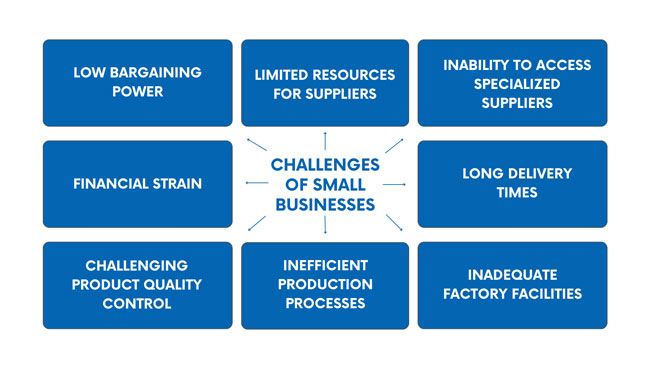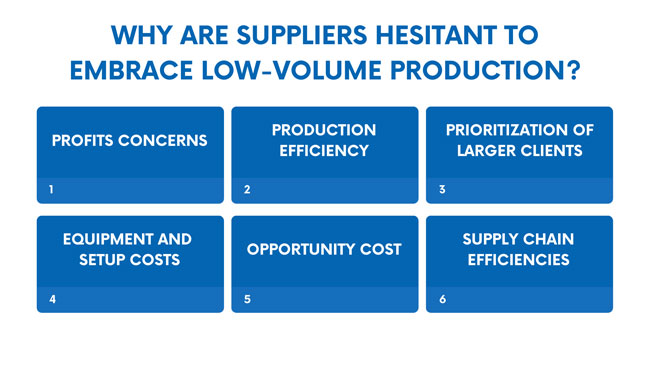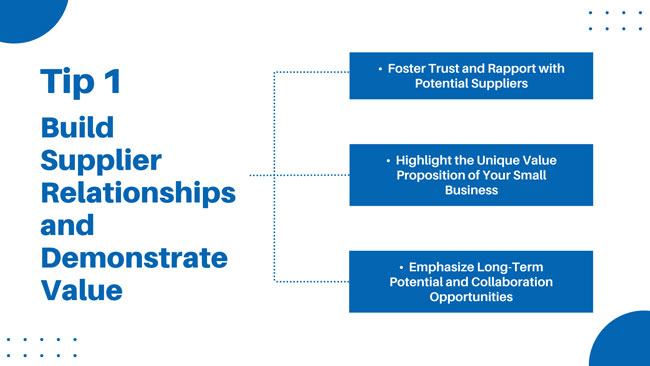Is Finding Suppliers for Small Business Difficult? Tips for Your Success
- Date:
- Author: SVI Content Team
- Share:
Are you a small business owner with a great product idea? You’ve poured your heart and soul into product R&D, and now it’s time to find a supplier to help you turn your vision into practice. Excitement is in the air as you begin your search, but you soon run into a common roadblock: suppliers are uninterested in taking low-volume orders.
As a small business, you face unique challenges in finding suppliers willing to collaborate on smaller production runs. Why finding suppliers for small business is hard? It’s understandable—suppliers often operate on economies of scale, and small-batch orders are less appealing to them. The struggle is real, and it can feel discouraging.
But fear not! This article will explore the reasons behind suppliers’ hesitations, and most importantly, provide essential tips and strategies to overcome these challenges and establish a successful supplier collaboration.
Part 1. Challenges of Small Businesses with Small Quantities to Find Suppliers
Questions like how to find supplier for small business always exist. But what are the challenges of small-batch procurement? There are some of the common challenges:
- Low Bargaining Power
- Limited Resources for Suppliers
- Inability to Access Specialized Suppliers
- Financial Strain
- Long Delivery Times
- Challenging Product Quality Control
- Inefficient Production Processes
- Inadequate Factory Facilities
Part 2. Why Are Suppliers Hesitant to Embrace Low-volume Production?
Understanding the reasons for supplier reluctance can tell us a lot about the challenges small businesses face in finding willing partners. Well, let’s take a look at the key factors:
1) Profits Concerns
Unlike large-volume production that runs result in lower unit costs and bigger order amount, orders with low volume may have higher unit costs but with less order amount, which resulted in fewer profits and same time consuming for manufacturers. That’s the reason why low-volume production is less appealing to suppliers who prioritize their financial bottom line.
2) Production Efficiency
Suppliers have established production processes and workflows optimized for larger volumes. Adjusting their operations to accommodate small orders can disrupt their efficiency and increase per-unit costs. This inefficiency poses a challenge for suppliers when considering low-volume production.
3) Prioritization of Larger Clients
Suppliers often prioritize their larger clients who provide consistent high-volume orders. These clients contribute significantly to their revenue and may have established long-term relationships.
4) Equipment and Setup Costs
Suppliers manufacturing bulk orders will use equipment for standardized requirements. Small batch manufacturing has unique production requirements. Suppliers may have to make adjustments to their machinery, reconfigure production lines, or acquire additional tools to accommodate smaller orders. These costs can be significant and deter suppliers from engaging in low-volume production.
5) Opportunity Cost
Choosing to take on low-volume orders means suppliers must allocate resources that could be utilized for higher-volume clients. This opportunity cost, in terms of production capacity and time, can impact their ability to accept and fulfill larger orders that could potentially yield more substantial financial benefits.
6) Supply Chain Efficiencies
Suppliers often have established supply chains that are optimized for larger production runs. Adapting the supply chain for small orders can disrupt these efficiencies and create additional delivery schedule dilemmas for suppliers.
Part 3. Tips for Successful Collaboration between Suppliers and Small Businesses
1. Build Supplier Relationships and Demonstrate Value
Creating strong relationships with potential suppliers is crucial for successful supplier partnership. Here are some tips to achieve that:
- Foster Trust and Rapport with Potential Suppliers
Trust is the foundation of any successful partnership. Take the time to establish open and transparent communication channels with potential suppliers. Engage in regular conversations, share information about your business, and demonstrate your commitment to ethical practices.
- Highlight the Unique Value Proposition of Your Small Business
Small businesses have their own unique strengths and advantages. Clearly articulate what sets your small business apart. Showcase your unique products, services, or market niche. Suppliers are more likely to be interested in partnering with businesses that offer something distinctive and valuable.
- Emphasize Long-Term Potential and Collaboration Opportunities
Suppliers prefer working with businesses that can provide regular and consistent orders and have long-term growth potential. Convey your vision for the future and discuss how the partnership can evolve and benefit both parties over time. And demonstrate your ability to maintain a steady demand for their products or services.
2. Leverage Your Unique Position
As a small business, you possess certain advantages that can be leveraged for successful collaboration. Express your unique and what you can offer to help them conquer the dilemma while manufacturing small batch orders.
- Emphasize Agility and Flexibility
Small businesses that have agility and flexibility are appreciated by suppliers. These businesses can quickly adapt to changing market conditions and customer preferences, allowing suppliers to be more responsive in meeting their needs.
- Demonstrate the Value of Customization and Niche Market Focus
Small businesses often excel in niche markets. Showcase your expertise and deep understanding of your target market. Suppliers may be attracted to the opportunity to tap into unique customer segments or offer differentiated products that align with their capabilities.
- Highlight Growth Potential
Small businesses have the growth potential, even with low volume. Share your outlined plans and explain how the partnership with suppliers can contribute to that growth. Suppliers may be more willing to collaborate when they see you have a clear path for future growth and long-term sustainability.
3. Create Win-Win Solutions
Creating a fair and mutually beneficial collaboration between buyers and suppliers is of utmost importance in fostering good and healthy supplier relationships. When both parties are on an equal level and strive for win-win situations, it sets the stage for long-term success.
- Find Mutually Beneficial Solutions
Engage in open discussions with suppliers to understand their needs, challenges, and goals. Identify shared objectives or interests, such as cost optimization, quality improvements, or lead time reduction. Collaborate on finding solutions that address both your requirements and their business objectives. By working together, you can create outcomes that satisfy both parties.
- Consolidate Orders or Collaborate
Instead of placing small orders with multiple suppliers, consider consolidating your orders with a single supplier. Alternatively, explore opportunities to collaborate with other small businesses or similar entities to combine orders and achieve larger quantities. This approach can help meet suppliers’ minimum order requirements and potentially secure more advantageous pricing and terms.
- Explore Payment Terms and Discounts
Discuss payment terms and negotiate favorable arrangements with suppliers. For example, you could propose shorter payment cycles or offer early payment incentives. By demonstrating reliability and commitment to timely payments, you can build trust and potentially negotiate better terms.
- Be Open to Trade-offs
Collaboration requires compromise. Be open to finding trade-offs that benefit both parties. For example, suppliers may appreciate your willingness to accommodate their production capabilities if you are flexible with delivery timelines or open to adjusting order quantities to fit their minimum requirements or production schedules.
Conclusion
How to find supplier for small business? There are many platforms where you can access small batch manufacturers at the starting point. But the challenges of low-volume orders are undeniable—How to successfully reach a cooperative intention?
The tips presented on this page point up the importance of open communication, mutual benefits, and a collaborative mindset when engaging with potential suppliers. By understanding each other’s needs and goals, small businesses can create a common ground that fosters standing supplier partnerships.
Additionally, if your company doesn’t possess much time to propel the process of sourcing appropriate factories, look for help from a sourcing company. For example, SVI Global, which has extensive experience in the supply chain, can help companies streamline the sourcing process and provide access to our industry networks and negotiation skills. This external support can save time and energy while assuring you quality suppliers and efficient production.
Moreover, the global presence of SVI Global helps you further widen the pool of available manufacturers. With the right strategies, support, and effective supplier relationship management, small businesses can overcome the challenges of sourcing suppliers for small quantities and thrive in their operations.












